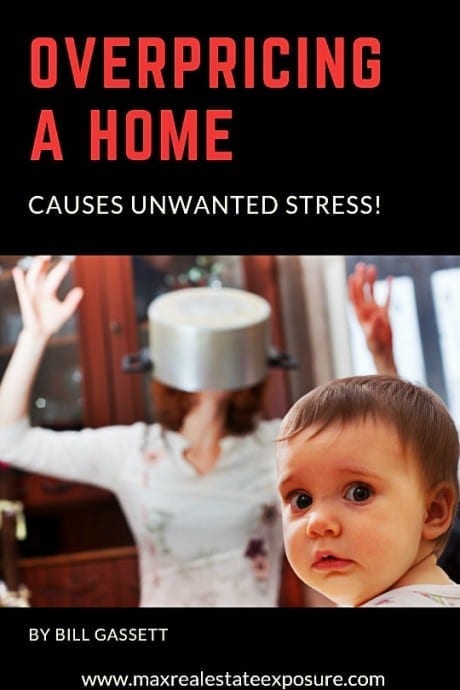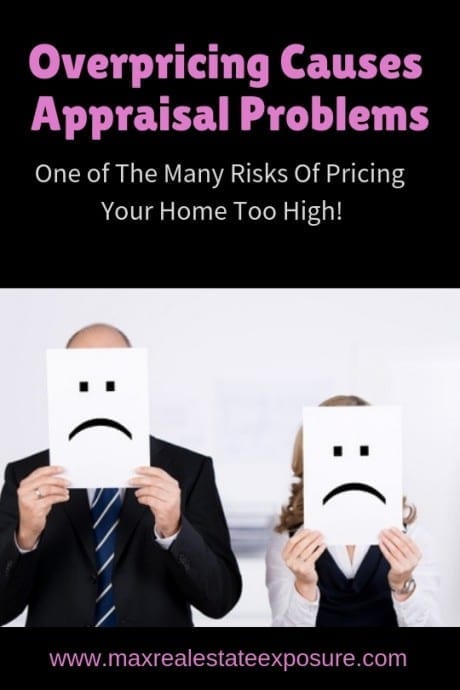The Problem With a Home Priced Too High
 Are you wondering what the risks are of pricing your home too high? A house priced too high can be the kiss of death.
Are you wondering what the risks are of pricing your home too high? A house priced too high can be the kiss of death.
One part art, one part science, determining your home’s asking price is no easy task.
You want your home to move, but you also want to get as much money as possible from the transaction.
It is probably one of the most significant sales you will ever make, but it also involves selling something important – a possession that may mean more to you than any other you own.
When you start the process of selling your home, though, you have to make a shift in your perception. This is business; you are selling a product in a larger market that will dictate much of your decisions.
You can ignore the current real estate market, but to do so is risky and a decision most people regret.
There are many risks of pricing your home too high. Most importantly, you will sell it for less than if it was priced appropriately!
This makes understanding the correct sale price of your home a critical exercise.
Many sellers fail to realize that pricing a home higher than it should be, does not increase the probability it will sell for more. It is the exact opposite!
Pricing a house too high has significant risks!
The Eager Real Estate Agent Often Prices a Home Too High
You may research the correct house pricing first or begin by looking for a real estate agent. What you will quickly realize, though, is that there is no shortage of real estate agents out there that will gladly consult with you in hopes of obtaining your listing.
Unfortunately, some are unscrupulous or inexperienced and may encourage you to list your home at a too high price. They know you want to hear that your home is worth a lot and will play upon those desires to get in on your sale.
Unfortunately, many real estate agents will mislead sellers about the market value of their homes.
This is not good for you for several reasons.
How A Home Priced Too High Creates Problems
Here are a few common issues and problems people encounter when they overprice their home, which can lead to you getting less than expected.
Real Estate Markets Can Change For The Worse
When you put your home on the market, you want it to spark interest in some buyers quickly, and you certainly want to sell it before the listing expires.
When your home first goes on the market, it should be appealing and at a price point similar to or better than comparable homes in your area. If the house is not priced right, buyers may ignore or notice it and place it in a “wait and see” category.
If it takes you six months or more to sell your home, the market may not cooperate with you. You may be forced to take a price much lower than your original asking price. Say you began with a price of $500,000. All other comparable listings in your area were at $475,000.
Your home did not sell, while all the other houses around you did. A year later, the average home price is $425,000 – a price you must take. This is an example of what can happen when Real Estate values are on a downward slide.
A few years ago, when markets around the country were going through a correction, I was selling quite a bit of Milford Real Estate, and it became brutally apparent to me that this particular town was getting hit more than some others.
It was essential to guide my clients by informing them of how prices continuously declined. Some owners reduced their prices, but values had slid even further by the time they did home.
You can see how it is essential to understand how the local market is performing. You can go from a seller’s to a buyer’s market and might not even know it.
Overpricing a Home Creates Stress
 Your family may be elegant and tidy. However, maintaining a home in showroom condition is a considerable amount of work, even for the cleanest individuals.
Your family may be elegant and tidy. However, maintaining a home in showroom condition is a considerable amount of work, even for the cleanest individuals.
You are setting your home’s price to get the maximum sum of money you can, but it must be pristine to attract buyers.
There is a constant need for staging for sale.
Clean floors, carpets, windows, kitchen, and bathrooms, no clutter, landscaping – all of these must be maintained for your home to shine.
This level of cleanliness is doable for most people for a month or maybe even three. But can you keep it up for six months or a year?
Failing to sell your home promptly is enough to lower the spirits of anyone, making it even harder to keep up appearances.
Selling is stressful and should be done as quickly as possible for the mental health of everyone in the home.
Mortgage Payments Continue
Every month your home remains on the market, you make mortgage payments. Every month it goes unsold; you pour more money into the house that you will not get back.
With a high price, there is no negotiating up. If there are no takers month after month, you are giving money away that you should not have to.
Overpricing Brings Negative Perceptions From Home Buyers
The opinion of your home as a desirable product is essential in real estate transactions. A shift in attitude on the part of buyers can cause you severe headaches and lose you significant amounts of money.
The longer your home sits on the market, the more you risk a negative shift in this perception – something you want to avoid if possible.
When your home first goes on the market, it will be considered by any number of buyers as long as the price is comparable to others and your real estate agent sells it correctly.
It may or may not be what everyone wants, but it is at least perceived neutrally.
However, the longer the home sits unsold, the more negatively it is viewed. Sitting for so long must mean it’s too expensive or have something wrong with it. Real estate agents working for buyers may steer them away from your property or tell them to wait for a price drop.
Some may see you as an easy target when you drop your price.
When the price drops, you might finally see an influx of potential buyers. Only these buyers hit you with lowball offers that can be frustrating and sometimes even upsetting. You know your home is worth more than these offers, but you are now trapped, and they know it.
Days on The Market Are a Killer in Real Estate
One of the questions that almost all buyers ask their agent is, “How long has the home been on the market?”. They ask this question for one reason: how flexible will the seller be? In real estate, the days on the market are your enemy.
It is safe to assume that the potential buyer will feel like they can negotiate more if your home has been on the market for a while. It is human nature to think this way because, in most instances, it’s the truth.
This is when some sellers choose to remove their homes from the market entirely if they can afford to and wait for the situation to be forgotten or for the market to shift in their favor.
Others have no choice but to sell and are forced to take less money than they would have had they just stuck with a reasonable price in the first place. When sellers say, “I have time to get my price,” they have no idea how the real estate market works.
In my thirty-seven years of selling real estate, waiting to get what you want never worked. The market tells you what you can get quickly.
Appraisal Problems Happen With a Home Priced Too High
 Sometimes, you may be lucky enough to get an offer at your favorable price. A buyer may agree that your home is unique and worth paying for.
Sometimes, you may be lucky enough to get an offer at your favorable price. A buyer may agree that your home is unique and worth paying for.
This may be due to inexperience, money may be less of an object to them, or you may have something they really and truly desire. However, you are not out of the woods yet.
For your buyer to get a mortgage, the bank must appraise your home.
Your buyer’s appraiser will use the prices of nearby, comparable homes – or “comps” – to help determine the price of your house.
The appraisal is similar to your real estate agent’s comparative market analysis.
If the appraiser determines that your price is too high, it can create not only a delay in the mortgage process but potentially a lender who will not loan on the property.
Sometimes the mortgage will still go through. Sometimes it will not. In cases where homes do not appraise, and there is an appraisal gap, a seller will need to reduce their price to meet the appraisal, or the buyer will need to come up with additional funds to make up the difference.
You will need to know how to deal with a low appraisal on a home. Most home buyers will not be so eager to shell more money over on a property the lender has determined is not worth it. Either way, you could endure costly delays.
A low appraisal is one of the more significant risks of pricing a home too high.
Online Search Problems With Misguided Pricing
Most buyers use the Internet in their initial home search. Screening homes online involves putting specific criteria into a quest to screen out unwanted homes. It may seem small, but when you price your home too far above the comps, you remove yourself from these searches.
If a buyer looks for homes from $400,000 – $500,000, and yours is $509,900, it will not be seen.
By pricing your home just a bit too high, thousands of potential buyers may never even know your home for sale. Sometimes a seller will cut off their nose despite their face thinking that if I price my home five thousand higher, I will put ten thousand more in my pocket. Wrong! It does not work that way.
You might as well price your home fifty thousand higher using that logic. It is one of the common home pricing myths many sellers believe.
How To Avoid Pricing a House Too High
As you can see, the potential problems with pricing your home too high are significant and can cost you a lot of money. There are several ways you can avoid falling into this trap, though.
Hire an Experienced Agent
 A good agent who closes on a lot of properties will not fill you with false hope. They will explain that, though you may have raised your family in this home or purchased it at the height of the real estate bubble, the market still rules. Respect it, and you will sell your home for a fair price.
A good agent who closes on a lot of properties will not fill you with false hope. They will explain that, though you may have raised your family in this home or purchased it at the height of the real estate bubble, the market still rules. Respect it, and you will sell your home for a fair price.
Look for an agent that has been in business for a few years and tends to sell homes quickly and near the original offering price.
An honest agent that doesn’t NEED your business is critical.
Understand what I mean by the word “need.” Agents needing business tend to give advice that suits them, not their clients.
If the Realtor you are working with has very few deals in the pipeline, they will probably be very anxious for their next sale.
A Realtor desperate for a paycheck is not the kind of agent you want. A top producer never worries about where their next sale is coming from.
Visit Open Houses to Learn About The Local Market
It would be best if you got an idea of the competition. It will help you see where your home stands, either better or worse than those on the market. Accurate information will help you make an informed pricing decision.
However, remember that you should not base the value of your home on what one of the neighbors thinks their home is worth. There is a good chance the neighbor’s home is not priced correctly, especially if it has been on the market for a while with no takers.
Don’t feel wrong about scoping out the competition at an open house, either. Real Estate open houses rarely ever work for selling a home and are typically heavily visited by other neighbors and tire kickers.
Nothing is more synonymous with an open house than “nosy neighbors”! You might as well join the party to get an accurate handle on what is going on in the local real estate market.
Don’t Use Zillow Estimates as Your Guide
Some sellers mistakenly believe that Zillow pricing estimates can be used to gauge real estate market value. Don’t be silly! You have better odds of meeting Big Foot than you do of seeing an accurate Zillow estimate or “Zestimate,” as they like to call it.
An online evaluation tool will never be able to replace a local real estate agent who knows the market. Don’t be foolish enough to believe a computer algorithm can determine the value of millions of homes nationwide.
I have seen values off by over $150,000, both high and low, from Zillow! You might as well price your home based on the assessed value. It will be no more accurate to do so.
Price Your House a Little Lower Than The Value
It would help if you were not afraid to price your home a little below the comps in your area. If it is priced well, you will see multiple offers and have the upper hand. You may see enough offers to start bidding on your home and eventually wind up with more money than you expected.
Pricing just a hair below the market is a common strategy in real estate that works well if you can get multiple bids on your property. This is the best position you can be in as a seller because buyers often let their emotions dictate their decision-making, not sound logic.
A buyer overpaying for your property in a multiple-bid situation is not out of the realm of possibility.
Final Thoughts on a House Priced Too High
You can sell your home at a reasonable time and for a fair price. Pricing too high is never a good idea. Avoid making this mistake, consult a good agent, and make your sale. With the right mindset, respect for the market, and the help of an experienced agent, you can put time on your side.
Did you start the listing price a little too high? Are you not getting much buyer activity on your home? Do you think it may be time for a price change?
If your home isn’t selling and most of your competition is, it’s a sign you have a problem.
Hopefully, after reading this, you have a much better understanding of the risks of pricing a home too high.
Additional Helpful References on Pricing a Home
- Eight lame reasons homeowners have for overpricing their property that they give to their agent Via Maximum Real Estate Exposure.
Use these additional references to ensure you price your home correctly and understand the likely consequences when you don’t! When you price your home correctly out of the gate, the odds dramatically increase the chances of sitting at a closing table in a reasonable amount of time.
As you can see, pricing your home too high has many risks. Best of luck!
About the author: Bill Gassett, a nationally recognized leader in his field, provided the above Real Estate information on a home priced too high won’t sell. Bill can be reached via email at billgassett@remaxexec.com or by phone at 508-625-0191. Bill has helped people move in and out of Metrowest towns for the last 37+ Years.
Are you thinking of selling your home? I am passionate about Real Estate and love sharing my marketing expertise!
I service Real Estate Sales in the following Metrowest MA towns: Ashland, Bellingham, Douglas, Framingham, Franklin, Grafton, Holliston, Hopkinton, Hopedale, Medway, Mendon, Milford, Millbury, Millville, Natick, Northboro, Northbridge, Shrewsbury, Southboro, Sutton, Wayland, Westboro, Whitinsville, Worcester, Upton, and Uxbridge MA.
